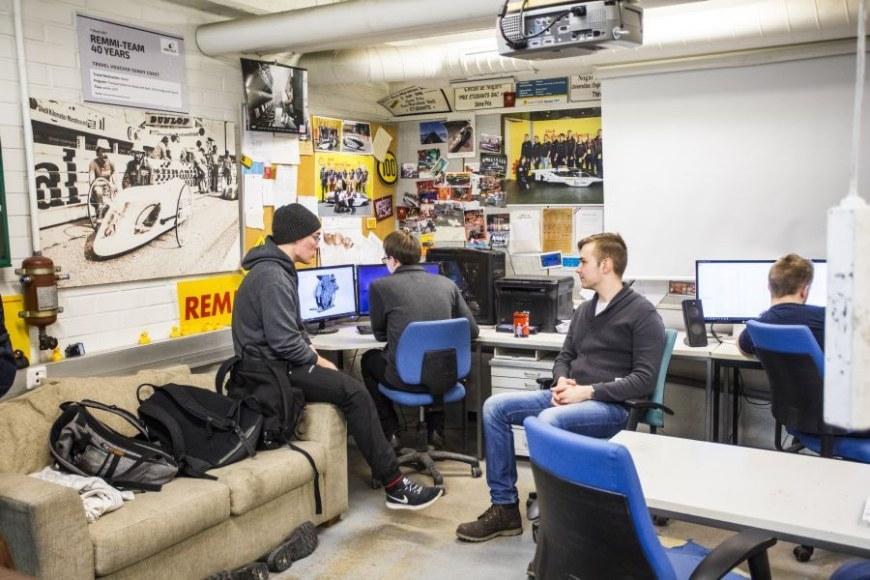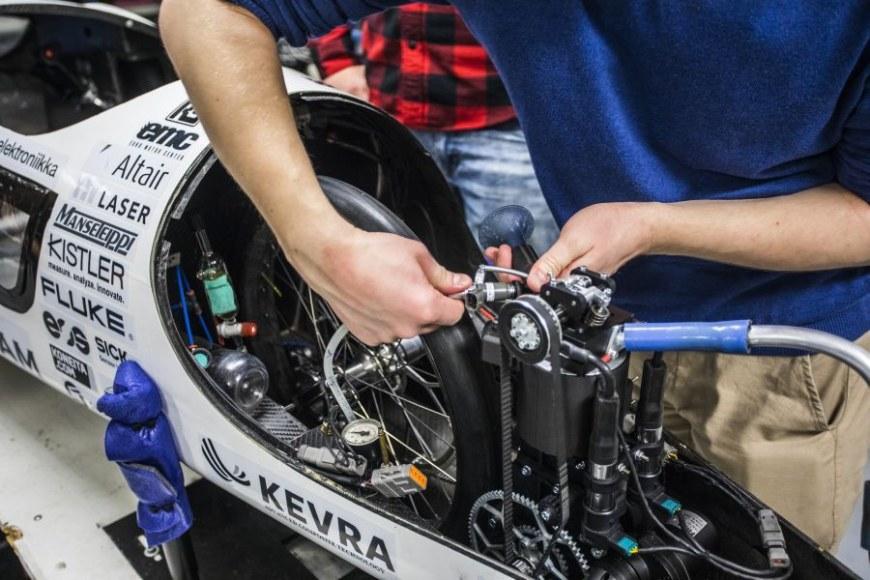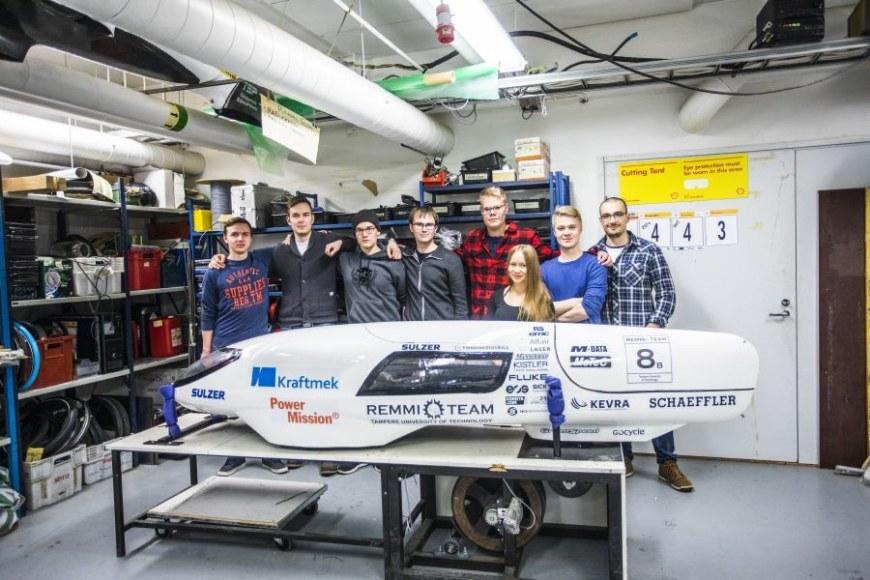Driving from Tampere to Ivalo and back again on a litre of fuel

This article was originally published in Unit, the magazine of Tampere Universities.
“Remmi 8B is definitely one of the world’s best race cars. It covered 2,020km on a litre of fuel at an eco-marathon in the year before last,” says Remmi-Team's Chair Henri Moilanen.
Remmi-Team has facilities on the Hervanta campus of Tampere University where the team members build as fuel-efficient cars as possible to compete in eco-marathons all over the world. The winner is the team that squeezes the most kilometres out of one litre of fuel.
“We had a run of back luck at the race in London last summer but still achieved an unofficial result that would have broken the all-time record in Sweden,” says Moilanen.
With the summer racing season approaching, the team is busy working on their latest vehicle in the basement of the Konetalo building. Remmi 8B’s engine has been replaced and expectations are running high. Past reliability and usability issues should now be resolved.
“We have completely redesigned the electronics and installed more sensors to collect data. As long as nothing unexpected happens come race day, we are anticipating a stellar season for our team,” predicts Moilanen.
Easy on the gas pedal
Jesper Granat is excited about the new engine control and data collection equipment.
“Our team has access to similar technology as some of the world’s top racing teams,” he says.
In exchange for state-of-the-art technology provided by sponsors and partner companies, the team members post content on social media, make videos and conduct small-scale tests. What makes collaboration with companies easier is the fact that many previous members of Remmi-Team work in prospective partner companies.
“Being a small and tight-knit team, we often get a chance to visit companies. When they invite us over, they may actually be looking to connect with potential new employees as the members of our team are in high demand among employers,” Moilanen and Granat say.
The team’s racing helmet has been hand-signed by none other than Kimi Räikkönen.
“He came to say hello to our team during an eco-marathon in London a couple of years ago,” says Moilanen and Granat.
The helmet will be worn by Tuuli Kankaala for the second time at a race in London next July. She was encouraged to join the team at a Student Activities Fair a few years back. The driver of an eco-marathon vehicle must be brave, tenacious – and lightweight. Kankaala, who is working towards a degree in engineering and natural sciences at Tampere University, fits the bill perfectly.
“I lay in the vehicle on my back with my feet pointing forwards. Racing is a little scary but cool. And it gets hot in there! Last summer the temperature inside the car climbed to more than 60 degrees Celsius. With so many cars on the track at the same time, it is important to remain focused throughout the race,” says Kankaala.

We built this!
Remmi-Team is one of the oldest student clubs at the former Tampere University of Technology and now at Tampere University. The team has attracted such widespread attention that Henri Moilanen, who studies mechanical engineering, and Jesper Granat, who studies electrical engineering, joined the team on the very first week of their studies.
“Courses provide us with theoretical knowledge but being part of Remmi-Team enables us to gain hands-on experience. That is what gets us working on the car every night even after working our summer jobs,” says Moilanen.
“We design and build the car from scratch, manage all the finances, maintain contacts with companies and take care of the travel arrangements,” they say.
More than fun and games
Remmi 8B runs on a spoonful of petrol, but similar fuel-stingy technology is not viable for commercial use as such. Still, the team members are committed to promoting environmental awareness while having fun.
“For me, environmental values are important and eco-marathons can help raise awareness of eco-driving and fuel economy,” says Tuuli Kankaala.
“Once we graduate we will be able to use the skills we have learned while building our vehicles, for example, to contribute to the development of energy efficiency,” says Jesper Granat.

Three to four grams of petrol
Before the teams competing in eco-marathons make it to the starting grid, the so-so projects are weeded out. The largest eco-marathons bring together a couple of hundred teams from all over the world. Most of the teams also include some racing professionals, and professors are often part of the university teams. Many have a sizeable budget. Remmi-Team is one of the few teams made up entirely of students.
“We are proud that our vehicle is built entirely locally on a shoestring budget,” says Henri Moilanen.
The 30ml fuel tank is weighed before the race begins. The cars run on regular 98-octane petrol. After the cars drive a fixed number of laps around a course, their fuel tank is weighed again. Remmi 8B consumes 3-4 grams of petrol in 30 minutes.
“We have formerly been able to do more than 3,000km to a single litre, but the regulations of eco-marathons have changed recently. Now our record with Remmi 8B is 2,187km per litre,” says Moilanen.

Running on empty since 1976
- Remmi-Team is one of the student clubs at Tampere University. The 20-odd members are students from different fields, such as mechanical, electrical, automation and materials engineering.
- The team designs and builds the most fuel-efficient vehicles possible and enters eco-marathons in Finland and abroad.
- The team holds the national record: 3,306km per litre of petrol.
- When Remmi-Team entered its first eco-marathon, the car was powered by a Demm engine taken out of a moped. The team named the first car Remmi 1, because in the regional dialect the letter D is pronounced as an R. Remmi 1 was capable of covering 172km on a litre.
- The current model is Remmi 8B. When the car is race ready it weighs 27kg.
Author: Sanna Kähkönen






